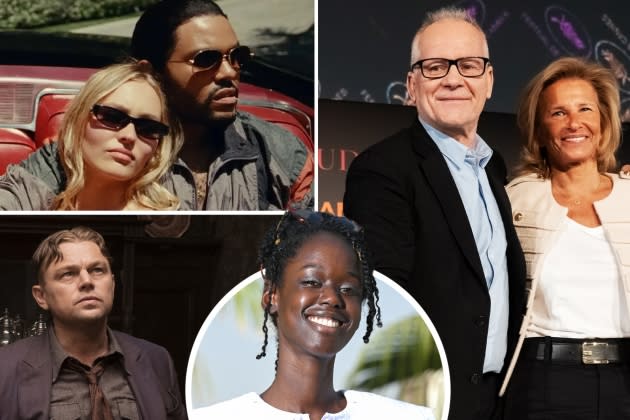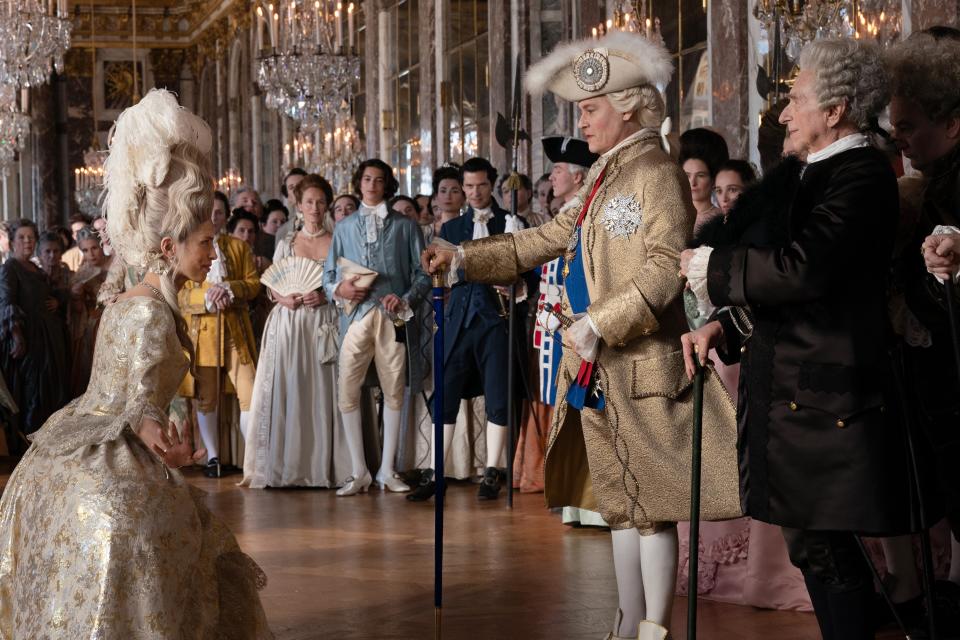Cannes Lineup Crunched: Seven Talking Points From A ‘Killers’ Dilemma To ‘The Idol’s Close-Up & A Netflix Dig?

The morning of the Cannes lineup press conference is often described by movie journalists as ‘Christmas for arthouse film-lovers’. Yesterday was no different, with fest head Thierry Frémaux returning in his role as Santa to dole out gifts to a bevvy of expectant industry and writers.
Below are some of the key talking points from another intriguing lineup, which will be officially unwrapped from May 16th.
More from Deadline
To Compete Or Not To Compete?
As it stands, Martin Scorsese’s Killers Of The Flower Moon will play Out Of Competition. However, Thierry Frémaux spelled out that he has been trying to convince Apple and Scorsese that their film should play in Competition. So far, the Moon is not for turning. The conversation is ongoing, so things could change — there is still space in the Competition. So what’s the issue? It was a real coup for the festival to get the Apple movie, which is one of the streamer’s most expensive and prestige projects to date. But having committed such a prized asset, it’s possible the studio and/or creatives don’t want their project [which has a similarly epic run time as The Irishman] subjected to the slings and arrows of a jury or for it to be deemed ‘tarnished’ in any way if it wasn’t to win. There’s precedent for that thinking among studios and even among some directors. With a budget reportedly in the region of $200M, there’s a fair amount riding on this one and Cannes is only the movie’s first step after all. You can read more about Scorsese’s inclusion here in our in-depth interview with Frémaux.
The Power Of Six
Encouragingly, there are a record six women directors in Competition. The selected films and filmmakers are La Chimera (Alice Rohrwacher), Club Zero (Jessica Hausner), Last Summer (Catherine Breillat), Anatomie d’Une Chute (Justine Triet), Banel et Adama (Ramata-Toulaye Sy), and Olfa’s Daughters (Kaouther Ben Hania). That’s only 31% of the Competition lineup, but it’s still progress, and Frémaux told us today another female director could still be added. The wider Official Selection features 14 female filmmakers from a total of 51 films. That’s only 27%, but represents another improvement on last year when only nine films were by women. The festival is unlikely to admit it, but the tone from Frémaux is changing too. He admitted to us yesterday that the stinging criticism the festival received in 2012 when the Competition was devoid of women directors “made me interrogate the situation and take a closer look”. He added: “Nobody wants to say it, but things are getting better. There are more women directors everywhere in the world. Things have changed. We and all the festivals are taking more care. I am not going to say that it’s a strategy, it’s rather a reflection of something natural.” The change would seem to be external and internal.
The Omissions
Among notable absentees yesterday were Woody Allen, Yorgos Lanthimos, Robin Campillo, Bruno Dumont, Bertrand Bonello, Michel Franco, Abderrahmane Sissako, Kitty Green, Cristi Puiu and Roman Polanski. Don’t be surprised if at least one of these are added to the lineup in coming days. Frémaux said he’s looking at making at least 5-6 additions. He told us he hasn’t seen Woody Allen’s new France-set film, nor that of Polanski. Also absent from the lineup are any Russian movies. The festival may sidestep lightning-rod filmmakers such as Allen and Polanski this year, but as with most major lineups, there remain tinges of controversy. Filmmaker Anurag Kashyap strenuously denied sexual misconduct allegations levelled at him by an actress three years ago, while as recently as last Friday, Maïwenn, the French filmmaker behind Cannes opener and Johnny Depp starrer Jeanne Du Barry, was at the centre of an assault allegation by a French journalist. Depp himself has yet to be cast in a U.S. movie since the messy libel case he lost against UK tabloid The Sun in 2020.

Vets Vs Rookies
One of Cannes’ perennial challenges is striking a balance between the number of established auteurs and newcomers. Cannes-goers are almost as enthused about the new wave as they are about the habitués and there has been disquiet from some corners online about the number of familiar faces in the main strand. While the debate continues, there are still discoveries to be made: Ramata-Toulaye Sy makes her feature debut in Competition, and there are eight debuts in Un Certain Regard. There are new films from Mongolia, Iran and Senegal among a diverse lineup.
Iris Blooms
Long-time Warner Media exec Iris Knobloch, who last year was anointed the festival’s first-ever female President, made her Cannes press conference debut yesterday. Her comments were pointed. “The studios have abandoned all types of day-and-date,” she beamed. “Films are no longer coming out simultaneously in theaters and via streaming. Several platforms have announced large investments in productions destined first for a theatrical release. It’s as if this multiplication of individual screens has reinforced the desire for a shared experience in the cinema, which is not replaceable. The Cannes Film Festival can be proud for always having been the torch-bearer for this type of cinema.” Cannes’ most famous battle in this arena has been with Netflix, which it hasn’t been allowed near its Competition due to the streamer’s release patterns. For years it seemed like the ascendant Netflix was winning a PR battle with Cannes due to the festival’s strict rules on theatrical releasing, but the industry’s direction of travel has recently changed again [Warner’s contentious release strategy on movies like Dune didn’t help] and while Knobloch didn’t namecheck Netflix, her and Frémaux praised Apple, Amazon and other streamers for committing to healthy theatrical windows. Cannes may have won this particular war after all.
The Idol‘s Closeup
In Sam Levinson’s buzzy Euphoria follow-up, starring The Weeknd and Lily-Rose Depp, a self-help guru and leader of a modern-day cult enters a complicated relationship with a rising pop idol. But that’s only half the story. A Rolling Stone exposé last month claimed the series was in turmoil due to a poor working environment, last-minute script rewrites and budgetary issues, all of which were denied by producers HBO and A24. There are few media glares as intense as Cannes, which can unravel a campaign before it has even begun, so this makes the decision to debut the first two episodes of the under-fire series — and presumably make talent and producers available to journalists — even more intriguing. We’ll find out soon enough the extent to which any reported problems manifest on screen.
Cannes Turns A Corner?
Are we seeing a new side to Cannes? The world’s premier film festival has always been a stubborn beast; one whose reverence for tradition and fear of fads has meant it isn’t afraid to zig while others zag. Its steadfastness has been heralded by some at a time of cancel culture and political correctness, but also used by others as a stick with which to beat the festival. As noted above, this year marks the first edition in 76 that the organization will be presided over by a woman; it also sees a record number of women in Competition and there’s no space so far for controversial regulars such as Woody Allen and Roman Polanski. In a welcome move, after our article decrying the practice last year, the festival didn’t demand to edit our interview copy with Frémaux [which meant the interview could go ahead]. Is this a more ‘progressive’ Cannes we’re seeing?
Best of Deadline
Hollywood & Media Deaths In 2023: Photo Gallery & Obituaries
TV Cancellations Photo Gallery: Series Ending In 2023 & Beyond
2023 Premiere Dates For New & Returning Series On Broadcast, Cable & Streaming
Sign up for Deadline's Newsletter. For the latest news, follow us on Facebook, Twitter, and Instagram.

